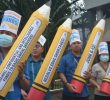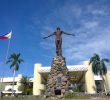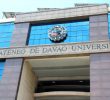QUEZON CITY, Philippines – The Philippines is about to have its first Filipino-trained gravitational physicist.
Reginald Christian Bernardo, a 28-year-old doctoral student and instructor at the University of the Philippines’ (UP) National Institute of Physics (NIP), defended and passed his dissertation entitled “Compact Objects, Cosmologies, and Gravitational Perturbations in Scalar-Tensor Theories of Gravity” last May 22, making him one step closer to being a doctor.
His thesis builds on the scientific foundations laid down by Sir Isaac Newton and Albert Einstein on gravitational physics by providing alternative theories to the study of gravity.
The UP College of Science’s official student publication Scientia broke the news in an article last May 26. Meanwhile, the university applauded the achievement in a Facebook post the following day.
Bernardo shared he neither planned on taking up gravitational physics nor a career in the sciences. “I always wanted to become a priest when I was younger. That’s why I entered the seminary,” he candidly shared.
After a two-year stay at the seminary, he decided to shift his attention to science. He applied and was accepted at NIP, where he graduated magna cum laude with a Bachelor’s Degree in Physics in 2015. Two years later, he earned his Master’s Degree along with the title of ‘Most Outstanding MS Student’. He eventually shifted to gravitational physics upon the influence of Dr. Ian Vega, who would eventually become his mentor on the subject.
Big milestone
Vega, who formed the NIP Gravity Group, a research group dedicated to the study of gravity of which Bernardo is part, calls his mentee’s successful defense a ‘big milestone.’
“We were initially surprised by the amount of attention it got, but we’re happy that he’s getting the attention. We’re also pleased that some light is being shed on our field,” he said. “I also think that it’s significant because it simply means that there will be more [scientists] after him, and that building a career in science can be done here,” Vega added, referring to the norm for Filipino scientists to take up higher education in other countries.
Bernardo shared his mentor’s initial shock, saying he only realized the impact of his achievement after catching the public’s eye.
“The news is spreading through my social media [accounts] right now. And so, I have to acknowledge that this is bigger than me. I did not plan this; and there were a lot of scientists in the field of gravity who came before me,” he said.
He also expressed his hopes that there will be more available supervisors for Ph.D. (Doctor of Philosophy) students like him, recalling his own experience as a student.
Lack of gov’t support, cultural shift
Vega echoed the sentiment, citing the relative lack of support given by the government to fundamental sciences.
“Right now, there’s only one of me. Including Reggie [Bernardo], there will be two of us. At NIP, we have the highest number of Ph.D.’s in physics in the country, but I think there are only 20 of us, so that’s still too little – considering that it’s the national institute. We really have to increase our numbers, to have a more vibrant physics community,” Vega said.
In the approved 4.1 trillion-peso 2020 national budget, the Department of Science and Technology was not included in the top 10 departments of the executive branch.
Furthermore, he said that a cultural shift needs to occur, wherein Filipinos no longer view a doctorate as simply an extension of the Bachelor’s and Master’s degrees, but as a dedication to discover more about the world around us.
But both he and Bernardo were optimistic that the situation of the Filipino science community will improve in the years to come.
“Scientific research does not stop, not even in times of pandemics,” Bernardo said. “And moving forward, there’s a lot of work to be done. There are a lot of projects on gravity right now, which means that science is alive and well.”
The soon-to-be doctor will receive his title upon graduation and is set to depart for Korea’s Asia Pacific Center for Theoretical Physics later this year for his post-doctoral fellowship. (davaotoday.com)










